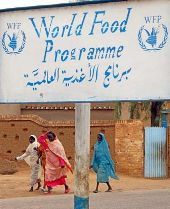World Food Program cites difficulties reaching hungry in Darfur
KHARTOUM, Sudan, Sep 7, 2004 (AP) — Seasonal rains and continued violence hampered efforts last month by the U.N. food agency to reach the hungry in Darfur, where fighting involving rebels, government troops and militias believed backed by the government has created a humanitarian disaster.
 “Perhaps the most serious obstacle of all is the sheer scale of the crisis,” the World Food Program said in a statement Tuesday, adding that the scattering of more than a million people in need across an underdeveloped area the size of France “is one of the sternest challenges confronting WFP.”
“Perhaps the most serious obstacle of all is the sheer scale of the crisis,” the World Food Program said in a statement Tuesday, adding that the scattering of more than a million people in need across an underdeveloped area the size of France “is one of the sternest challenges confronting WFP.”
The agency said it had delivered food for more than 1 million people in Darfur in August, short of its target of 1.2 million.
“Considering the severe constraints we faced in August and continue to face this month, reaching nearly a million people in August does indicate that we are starting to meet the huge challenges in Darfur,” said Ramiro Lopes da Silva, WFP’s Khartoum-based director in Sudan, said in the statement.
But he added: “The number of people that remain to be reached is worryingly high and we simply have to do better in September.”
Da Silva called for more financial support from the international community. According to the statement, of WFP’s overall requirement of US$252 million for its Darfur operations in 2004, the agency has so far received only US$158 million.
The rainy season reached its height in August, flooding roads, washing away sections of the region’s single rail line and frequently rendering unusable the dirt runway in the capital of West Darfur, worst affected by the rains of the region’s three states.
WFP also said clashes between government forces and the rebel Sudan Liberation Army were more frequent than in recent months, despite a cease-fire declared April 8, creating more access problems for aid workers.
Aid agencies had complained earlier that the government had blocked them from working in Darfur. Those problems have been resolved, but the delays meant much was left to be done after the rains started.
The rebels also have been accused of hampering aid work, but not on the same scale as the government. The rebel Sudan Liberation Army has twice been accused of briefly detaining small groups of aid workers.
The violence erupted in February 2003, when two rebels factions drawn largely from black African tribes rose up, accusing the Arab dominated government in Khartoum of neglect and discrimination. For years there had been low level conflict between African farmers and Arab herdsmen competing for scarce water and other resources in the vast, arid region.
The government is accused of recruiting Arab militias known as Janjaweed to crush the rebellion with a scorched earth policy some international human rights groups have said amounts to ethnic cleansing or even genocide. The government has denied backing the Janjaweed and says Darfur’s suffering is being exaggerated.
